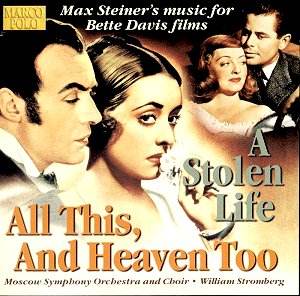This is a marvellous disc. It’s packed with information
and insight and biographical details, with recollection and analysis,
added to which there are evocative period photographs and copies
of Steiner’s musical sketches complete with the visual cues ("He
stops"). And then there’s the music. Steiner, always one
of the most accommodating of film composers in that he favoured
through-composition, always makes for riveting listening and ensures
that the superb restoration by John Morgan makes not only for
a colourful and impressive one but also one that stresses the
cogency of the scores, especially the main focus of interest here,
All This, And Heaven Too, one of Steiner’s best Bette Davis
scores.
The 1940 score provides music for three quarters
of an hour in this restoration. Previous excerpts have really
been no more than snippets (Charles Gerhardt recorded a brief
selection nearly thirty years ago). Here we have a brash opening
Main Title followed immediately by some noble horns and entwining
strings, warm and mellow, in the cue beginning To France.
Steiner conveys the Carriage Ride with a degree of pensive
expectation before an almost syncopated gentility emerges in the
scoring, deliciously evoking mid nineteenth century gallantry.
He can even throw in the overture to Gluck’s Armida at
one point and has elsewhere a rich command of instrumentation
– in A Night to remember for Louise for instance behind
the thinned strings one can detect Steiner’s characteristic harp
and glockenspiel. To listen to Steiner at his most perspicacious
one should perhaps go to All Hallows Eve and the following
cues where nobility of utterance is immediately shattered by a
jeering, eerie chorus; Steiner’s lyrical arches work on the basis
of repetition and assimilation not on static cues and this makes
a work like this all the more rewarding.
His romantic gentility in this score is accompanied
by grim foreboding and foreshadowing (track 9 et seq) in a kind
of trio section before the effulgence of a near Mendelssohnian
moment of enchantment breaks over one. Steiner’s use of Tristanesque
allusions can be faintly traced in the despairing eloquence of
the eleventh track beginning Rushing to a Dying Duke and
the general musical ethos that Steiner evokes here becomes explicit
when he half quotes the puckish-tearstained end of Rosenkavalier
– indeed he goes further throughout the score where elements of
Le Bourgeois gentilhomme predominate and wittily so.
A Stolen Life dates from 1946. There’s
witty use of hornpipe material – the scene is by the sea in New
England - and again superb use of the harp. The cue Karnock
features some ominous lower string and bass clarinet writing
as well as suitably catchy, "shopping" music full of
delighted swagger. The Good and Bad sister motif is reinforced
by the music which posits freedom against insinuating sonorities
but there’s also some creative recycling going on here. Steiner
borrows some of his own music from King Kong for the evocative
storm music (the studio had wanted Debussy’s La Mer but
the fee asked was much too high).
These forces are fast becoming premier league
– indeed have long since become premier league – interpreters
of these kind of scores for this series. These are no run-throughs
and William Stromberg leads with delightful but controlled insight.
Most enthusiastically recommended to Steiner admirers.
Jonathan Woolf
